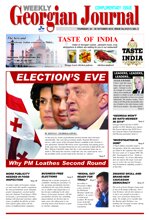This is the president Georgia really needs
24 October, 2013
 To leave aside the current candidates and what people think of them, here are some thoughts on the ideal next president. The system is new. In the past, under the constitution passed illegally and in three days on 6 February 2004, the president was the supreme executive power in Georgia and had significant power even over the parliament and judiciary. Informally, the president had power over what and whoever he wanted. And power was wielded informally among deputies who would be rotated around positions, but their power had largely to do with their inner circle relationship with the president.
To leave aside the current candidates and what people think of them, here are some thoughts on the ideal next president. The system is new. In the past, under the constitution passed illegally and in three days on 6 February 2004, the president was the supreme executive power in Georgia and had significant power even over the parliament and judiciary. Informally, the president had power over what and whoever he wanted. And power was wielded informally among deputies who would be rotated around positions, but their power had largely to do with their inner circle relationship with the president.Now formally the president still has power but for the last year, informally he has lost almost all of it. The informal and informal power has gone to the prime minister. In part because he was the one who united the opposition against the National Movement, in part because he has several billion dollars and in part because there is nobody else. How he is wielding this power and maybe even more importantly how he will wield that informal power after he leaves office is an important, maybe THE important question in Georgia's immediate future.
But in terms of the formal institutional arrangements the role of the president is clear. She or he will be a largely a figure head. There will be only modest formal responsibilities that will be similar to those of a king or a queen in some Western European or Asian countries. Some ceremonial powers, but we hope not enough to bring down the institutions of the state in case a lunatic gets elected at some point in the future. So does it even matter who the president is? Yes and no. If the president is a weak character, then she or he will simply become irrelevant, as has happened with many people who supposedly headed important sounding institutions but actually couldn't get it organized because in reality they were not the ones in charge. But if the president is strong and plays the right role, she or he can be a great asset to the country. And ideal president would have four qualities:
First, s/he would be a uniter not a divider. Senior politicians in Georgia spend too much time and effort criticizing political opponents. That is unlikely to change. But a president who can gain respect from all sides, can do a great deal to neutralize a poisonous relationship between two groups in a society. This is what everybody hoped for with Morsi in Egypt. But instead he viewed himself as the president for the half of the country who voted for him and the other half he actively worked and spoke against. In the process he set back Egypt's development by a decade at least. And is now in jail after serving for a year.
Second, s/he should criticize infrequently. The position is largely ceremonial. Stick to cutting ribbons. Speeches should be general and focus on framing, how is a new way to look at the world. That is what ceremonial positions do. But spend time with those who don't have much of a voice of their own. Spend time in the areas outside of Tbilisi that are not frequently visited. Understand particularly those who are not understood. Spent time championing hidden people and hidden policy ideas rather than throwing around the same criticism on the same topics as everybody else.
Third, Georgia needs some honesty. Honesty about what has happened, what is happening. Confronting the recent past rather than mythologizing it is a necessary prerequisite to development. That is true nationally as well as individually. Good presidents do not have to bear that responsibility individually and personally but they should at least not hide from the truth, including their own involvement in events. If they can not speak honestly and with heart about their own mistakes, they are not brave enough to be president.
And finally last of all, s/he needs to be able to work with but also speak frankly in private to the prime minister. Any prime minister needs what in America is called a Dutch Uncle. The Dutch are famous in Europe for saying without hesitation exactly what they are thinking. The prime minister has many friends but few people he respects who can tell him he is doing something wrong. Being able to have this balance is difficult but decisive. So what do we think? Will we get those qualities?













































